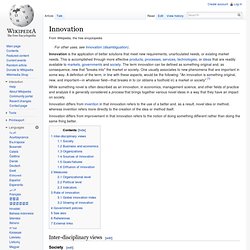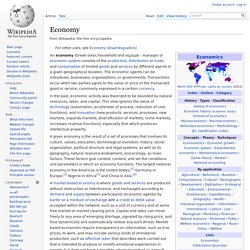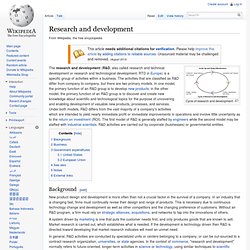

Innovation. While something novel is often described as an innovation, in economics, management science, and other fields of practice and analysis it is generally considered a process that brings together various novel ideas in a way that they have an impact on society.

Innovation differs from invention in that innovation refers to the use of a better and, as a result, novel idea or method, whereas invention refers more directly to the creation of the idea or method itself. Innovation differs from improvement in that innovation refers to the notion of doing something different rather than doing the same thing better. Inter-disciplinary views[edit] Society[edit] Due to its widespread effect, innovation is an important topic in the study of economics, business, entrepreneurship, design, technology, sociology, and engineering.
Innovation is not only a modern phenomenon. Business and economics[edit] In business and economics, innovation is the catalyst to growth. Organizations[edit] According to Peter F. Economy. In the past, economic activity was theorized to be bounded by natural resources, labor, and capital.

This view ignores the value of technology (automation, accelerator of process, reduction of cost functions), and innovation (new products, services, processes, new markets, expands markets, diversification of markets, niche markets, increases revenue functions), especially that which produces intellectual property. A given economy is the result of a set of processes that involves its culture, values, education, technological evolution, history, social organization, political structure and legal systems, as well as its geography, natural resource endowment, and ecology, as main factors. These factors give context, content, and set the conditions and parameters in which an economy functions. The largest national economy in the Americas is the United States,[1] Germany in Europe,[2] Nigeria in Africa[3] and China in Asia.[4] Range[edit] Etymology[edit] History[edit] Ancient times[edit] Social network. Social networks and the analysis of them is an inherently interdisciplinary academic field which emerged from social psychology, sociology, statistics, and graph theory.

Georg Simmel authored early structural theories in sociology emphasizing the dynamics of triads and "web of group affiliations. "[2] Jacob Moreno is credited with developing the first sociograms in the 1930s to study interpersonal relationships. These approaches were mathematically formalized in the 1950s and theories and methods of social networks became pervasive in the social and behavioral sciences by the 1980s.[1][3] Social network analysis is now one of the major paradigms in contemporary sociology, and is also employed in a number of other social and formal sciences. Together with other complex networks, it forms part of the nascent field of network science.[4][5] Overview[edit] History[edit] Levels of analysis[edit] Self-organization of a network, based on Nagler, Levina, & Timme, (2011)[32] Micro level[edit] In J.A. Research and development. Cycle of research and development The research and development (R&D, also called research and technical development or research and technological development, RTD in Europe) is a specific group of activities within a business.

The activities that are classified as R&D differ from company to company, but there are two primary models. In one model, the primary function of an R&D group is to develop new products; in the other model, the primary function of an R&D group is to discover and create new knowledge about scientific and technological topics for the purpose of uncovering and enabling development of valuable new products, processes, and services.
Under both models, R&D differs from the vast majority of a company's activities which are intended to yield nearly immediate profit or immediate improvements in operations and involve little uncertainty as to the return on investment (ROI). Background[edit] Business[edit] Present-day R&D is a core part of the modern business world.